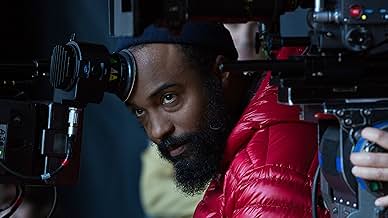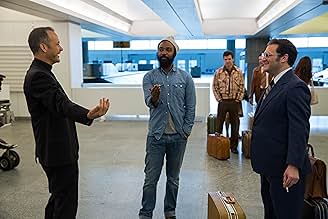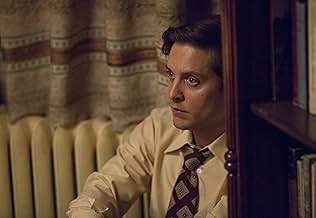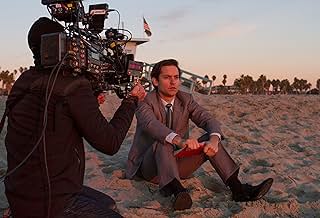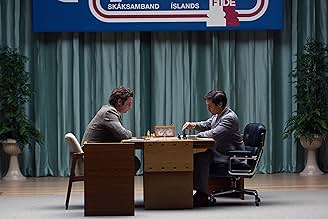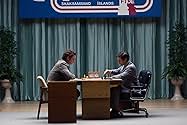Zur Zeit des Kalten Kriegs findet sich der junge Bobby Fischer, das größte Schachtalent der Vereinigten Staaten, zwischen den Fronten zweier Supermächte und seinem eigenen Widerstand gegen d... Alles lesenZur Zeit des Kalten Kriegs findet sich der junge Bobby Fischer, das größte Schachtalent der Vereinigten Staaten, zwischen den Fronten zweier Supermächte und seinem eigenen Widerstand gegen das Sowjetische Imperium.Zur Zeit des Kalten Kriegs findet sich der junge Bobby Fischer, das größte Schachtalent der Vereinigten Staaten, zwischen den Fronten zweier Supermächte und seinem eigenen Widerstand gegen das Sowjetische Imperium.
- Auszeichnungen
- 1 Gewinn & 1 Nominierung insgesamt
- Cyril
- (as Shawn Cambell)
Empfohlene Bewertungen
This is the highly fictionalized story of Bobby Fischer, a chess fanatic and genius who rose to the very top of his field. He was part of a Russia vs. U.S. superiority struggle when he played Boris Spassky (Liev Schreiber), the world champion back then, in the '70s. It's unlikely he understood that; he didn't have a broad or worldly focus. The chess was all he cared about, that and money.
Biopics sometimes take a lot of liberties. Characters are made up, time is shortened, incidents are moved around, elements are put in for dramatic emphasis. That's why you can't take a biographical film as factual. It's better if you become interested in the person and read about him, as I did about Fischer, though I remember him.
Toby Maguire does a fantastic job as Fischer. Yes, Fischer was tall and Maguire is short. Frankly I wasn't made aware of Maguire's height while watching the film.
I believe the filmmakers were trying to give us a psychological story -- a complete genius with an IQ of 181 but one who also had mental problems. Lots of so-called geniuses are strange, I suppose, but Fischer was a real study in opposites.
He often made unreasonable, last-minute demands, made anti-Semite remarks, and accused the Russians of colluding against him. In the second game of his world championship against Spassky, he didn't show up. Nevertheless, his achievements in chess were remarkable, and many consider him the greatest chess player who ever lived.
His later life was a mess; he became reclusive; his passport was revoked and finally, Iceland took him in. By then he was off the wall completely.
Edward Zwick directed this film with a lot of zip and made it an intense and absorbing experience, as did the actors.
Look at this as the psychological story of a phenomenal talent whose emotional/mental problems interfered with his life and career. Don't take it as the detailed life of Bobby Fischer, his relationship with his mother, and who taught him what. The most interesting thing about him was his incredible talent.
Some reviewers pointed out some chessic type errors but there weren't that many and they were minor. Here's one they got right that may surprise some people. Notice that Fischer used the descriptive notation ("P-K4") while most other grandmasters even back in 1972 used algebraic notation ("e4"). And while there were chess clock on analyst boards where they serve no purpose at least the boards were set up right with the white square at the player's right hand, avoiding a common error in movies.
Probably the biggest error had nothing to do with chess but with the fact that Fischer's mental illness at the time of the Spassky match had not developed as much as the movie suggests. His personality was more rounded than displayed. He actually had a charming side. People liked him in spite his bad manners and selfishness. There's a YouTube video of him on TV with Bob Hope filmed sometime shortly after the match with Spassky that shows a very different Fischer than the one Maguire portrayed.
The bit with the girl (sarcastically she says to Fischer: "it was good for me too" as he studies a chess game in bed) was apparently director Edward Zwick's take on the nagging question of Fischer's sexuality, meaning yes he was heterosexual, but chess was just more interesting.
The real disappointment for me was that they did not make clear the really great triumphant of Fischer's preceding the championship match. He destroyed three of the top grandmasters en route to the title match, at one point winning 20 games in a row. Amazing. The greatest streak in grandmaster history. So he was a clear favorite although Spassky was the World Champion. That's why he wanted so much to win the first game and confirm immediately that he was clearly superior.
I was also disappointed that Fischer's life after winning the championship was not explored. I had hoped for a cinematic take on what happened to "The Wandering King" (the title of a book about his life by Hans Bohm and Kees Jongkind). Perhaps that material would be better presented in a documentary than in a popular flick.
Bottom line: worth seeing but not as good as I had hoped.
--Dennis Littrell, author of "The World Is Not as We Think It Is"
This is based on the real life of chess legend Bobby Fischer who after he became world champion, he lived a secluded, solitary life possibly because of a mental illness which made him paranoid.
I am not a fan of Tobey Maguire (poor choice for Spiderman IMO) but he gives a convincing performance in this. His tantrums and his stares as he is building irrational thoughts about conspiracies and imaginable dangers are s strong plus to the film.
The pace of the film is also good and the music by the veteran James Newton Howard follows the emotions with grace.
Overall: Recommended
Wusstest du schon
- WissenswertesBobby Fischer was wanted in the United States of America for violating economic sanctions against the former Yugoslavia by playing a chess match there in 1992. He fled to Japan and was arrested in July 2004 for trying to leave Japan on a revoked U.S. passport. Thus, he was detained in Japan awaiting deportation to the USA. He renounced his U.S. citizenship and tried to become a German citizen, but was denied. Finally, in March 2005, Iceland's parliament voted to grant him Icelandic citizenship. He remained a fugitive from the USA until his death.
- PatzerFischer is shown resigning the first game immediately after Spassky traps his bishop. In fact, he played on for another 26 moves before giving up.
- Zitate
Paul Marshall: I think he's afraid of what's gonna happen if he loses.
Father Bill Lombardy: No, he's afraid of what's gonna happen if he wins.
- Crazy CreditsIn the closing credits, the name of the character Cyril (played by Shawn Campbell) is misspelled "Cryil."
- VerbindungenFeatured in Bobby Fischer, The Cold War and the Match of the Century (2015)
- SoundtracksAlong Came Betty
Written by Benny Golson
Performed by Art Blakey and The Jazz Messengers
Courtesy of Concord Music Group, Inc.
By Arrangement with Time Step Music
Top-Auswahl
Details
- Erscheinungsdatum
- Herkunftsland
- Offizielle Standorte
- Sprachen
- Auch bekannt als
- La jugada maestra
- Drehorte
- Produktionsfirmen
- Weitere beteiligte Unternehmen bei IMDbPro anzeigen
Box Office
- Budget
- 19.000.000 $ (geschätzt)
- Bruttoertrag in den USA und Kanada
- 2.436.633 $
- Eröffnungswochenende in den USA und in Kanada
- 202.053 $
- 20. Sept. 2015
- Weltweiter Bruttoertrag
- 5.578.519 $
- Laufzeit
- 1 Std. 55 Min.(115 min)
- Farbe
- Seitenverhältnis
- 2.35 : 1







